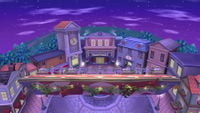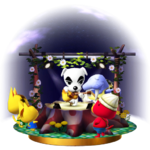Town and City: Difference between revisions
KirbyMelee (talk | contribs) No edit summary |
No edit summary |
||
| Line 21: | Line 21: | ||
'''Town and City''' ({{ja|村と街|Mura to Machi}}, ''Village and City'') is a stage in {{forwiiu}}. The stage is set in the village and the city variants from ''{{s|nookipedia|Animal Crossing: City Folk}}'' for the Wii. | '''Town and City''' ({{ja|村と街|Mura to Machi}}, ''Village and City'') is a stage in {{forwiiu}}. The stage is set in the village and the city variants from ''{{s|nookipedia|Animal Crossing: City Folk}}'' for the Wii. | ||
==Stage | ==Stage Layout== | ||
The stage is similar in layout to [[Smashville]], a previous ''Animal Crossing'' stage. There is a single main platform which has different smaller platforms above it depending on its location. The main platform will travel between town and city background areas, hence the stage's name. In the town section, three small platforms appear above the main one, appearing over the left, middle and right of the stage; in the city section, there are only two, appearing over the left and right sides. These platforms all move slightly, and fly away when the stage transitions. The stage stays at each section for about 30 seconds, then takes about 15 seconds to transition to the other. | The stage is similar in layout to [[Smashville]], a previous ''Animal Crossing'' stage. There is a single main platform which has different smaller platforms above it depending on its location. The main platform will travel between town and city background areas, hence the stage's name. In the town section, three small platforms appear above the main one, appearing over the left, middle and right of the stage; in the city section, there are only two, appearing over the left and right sides. These platforms all move slightly, and fly away when the stage transitions. The stage stays at each section for about 30 seconds, then takes about 15 seconds to transition to the other. | ||
| Line 63: | Line 63: | ||
*Wisp | *Wisp | ||
== | ==Ω Form== | ||
The main platform platform players fight on is still the same but the smaller platforms, balloons, and background characters are gone. The stage still transitions to the town and city however. | |||
<gallery widths="200px"> | |||
File:SSB4UTown&CityOmega.jpg|[[Final Destination (SSB4)|Ω Mode]] | |||
</gallery> | |||
==Origin== | ==Origin== | ||
| Line 139: | Line 139: | ||
|} | |} | ||
== | ==Trophy Description== | ||
[[File:TownAndCityTrophyWiiU.png|thumb|left|150px|Town and City trophy in ''for Wii U''.]] | |||
''Get a bird's-eye view of the town and city from Animal Crossing: City Folk as you fight on a platform overhead. Your Wii U console's clock dictates the time of day and which animals and places appear. Don't get too distracted by all that, though, because the platform itself is pretty simple-perfect for a battle of skill!'' | |||
{{Trophy games|console1=Wii|game1=Animal Crossing: City Folk (11/2008)}} | |||
{{clear}} | |||
==Gallery== | ==Gallery== | ||
Revision as of 16:39, March 22, 2016
| Town and City | |
|---|---|
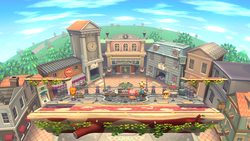 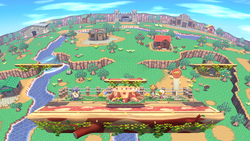 
| |
| Universe | Animal Crossing |
| Appears in | SSB4 (Wii U) |
| Availability | Starter |
| Maximum players | 8 |
| Tracks available | Plaza / Title (Animal Crossing: City Folk / Animal Crossing: Wild World) Tour (Animal Crossing: New Leaf) Kapp'n's Song Outdoors at 7 p.m. (Sunny) / Main Street Bubblegum K.K. K.K. Slider tracks: K.K. Cruisin' K.K. Condor K.K. Western K.K. Gumbo Rockin' K.K. DJ K.K. |
| Articles on Nookipedia | Town City |
Town and City (村と街, Village and City) is a stage in Super Smash Bros. for Wii U. The stage is set in the village and the city variants from Animal Crossing: City Folk for the Wii.
Stage Layout
The stage is similar in layout to Smashville, a previous Animal Crossing stage. There is a single main platform which has different smaller platforms above it depending on its location. The main platform will travel between town and city background areas, hence the stage's name. In the town section, three small platforms appear above the main one, appearing over the left, middle and right of the stage; in the city section, there are only two, appearing over the left and right sides. These platforms all move slightly, and fly away when the stage transitions. The stage stays at each section for about 30 seconds, then takes about 15 seconds to transition to the other.
Like Smashville, the stage's lighting and design change at different times of day, including day, evening, and night versions; this is determined by the system's clock. Sometimes, the Roost can be seen in the background of the stage. Also, like in Smashville, on Saturday nights starting from 8:00pm, K.K. Slider will appear to perform his songs. He only appears in the background for the town section of the stage, though the music continues when the platform is in the city.
Background Characters
Like Smashville, Town and City features several background characters. The following characters appear in the background of Town and City:
- Blathers
- Brewster
- Celeste
- Crazy Redd
- Don Resetti
- Dr. Shrunk
- Frillard
- Gracie
- Gulliver
- Harriet
- Joan
- Katie & Kaitlin
- Katrina
- Kicks
- Labelle
- Lloid
- Lyle
- Mabel
- Mr. Resetti
- Pascal
- Pelly
- Phineas
- Phyllis
- Rover
- Sable
- Saharah
- Serena
- Timmy
- Tommy
- Tom Nook
- Tortimer
- Wendell
- Wisp
Ω Form
The main platform platform players fight on is still the same but the smaller platforms, balloons, and background characters are gone. The stage still transitions to the town and city however.
Origin
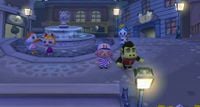
This stage originates from Animal Crossing: City Folk (Animal Crossing: Let's go to the city in the PAL-region). One main platform joined with two smaller floating platforms are used as the fighting arena. The stage literally revolves around the Animal Crossing: City Folk village and city. An extra background platform consisting of Animal Crossers hovers behind the main arena whenever it stops. Some of the villagers are city/village exclusive.
In 2001, a Japanese Nintendo 64 game called Animal Forest was released, which is the first game in the Animal Crossing franchise. Animal Forest was translated, and ported to the GameCube as Animal Crossing (also known as Animal Crossing: Population Growing) with some added features, such as the Able Sisters building and the Museum. As Animal Forest is the first Animal Crossing game, the GameCube version is a remake of the same game.
Each Animal Crossing game is mostly set in a small town. A typical town can be seen in the Town variation of this stage. Here are all the buildings that appear in the background in the Town variation:
| Building | Origin Game | Purpose |
|---|---|---|
| Able Sisters | Animal Crossing | Design patterns for shirts and umbrellas, which the player can then wear or trade. |
| Animal Villager Houses | Animal Crossing (design from City Folk) | Residence of the non-playable villager characters. |
| Fountain | Animal Crossing: City Folk | Appears in front of the gate after the second town fund is completed. |
| Museum | Animal Crossing | Where the player can donate their bugs, fish, paintings, and fossils that they caught for viewing. |
| Nook's Cranny | Animal Crossing (design from Wild World and City Folk) | The first incarnation of Tom Nook's store where purchases of a small variety of items can be made. |
| Player's House | Animal Crossing (design from City Folk) | Residence of the player who can buy furniture, wallpaper, and floor designs for the interior. |
| Town Gate | Animal Crossing: City Folk (Castle style) | Allows the player to visit another player's town. |
| Town Hall | Animal Crossing: Wild World | Where the player pays off his or her debt to Tom Nook, reports other villagers, send mail etc. |
The town itself in SSB4 retains almost everything that can be seen in a town in the Animal Crossing series such as trees, rocks, flowers, a river, bridges, etc. The bus station in the Town can be seen by the Town Gate, and there a bus sign on the same platform as the arena itself.
In City Folk, the player can go to the bus stop in the town and take a bus to the city. The city contains various shops and hosts events. The overall design of the City variation of this stage in SSB4 is retained. The buildings that can be seen in the background include:
| Building | Purpose |
|---|---|
| Auction House | Where items can be displayed and bid on by the player and their friends via Wi-Fi. |
| GracieGrace | Where expensive furniture, clothes and accessories are sold. |
| Happy Room Academy | Players can check their score here, and it is also where the model room is. |
| The Marquee | A theater where the player can learn emotions. |
Trophy Description
Get a bird's-eye view of the town and city from Animal Crossing: City Folk as you fight on a platform overhead. Your Wii U console's clock dictates the time of day and which animals and places appear. Don't get too distracted by all that, though, because the platform itself is pretty simple-perfect for a battle of skill!
Gallery
Villager using Lloid Rocket in the city variation.
Toon Link on the stage.
Greninja and Toon Link on the stage in the evening.
Trivia
- Town and City is the only stage in Super Smash Bros. for Wii U to have all of it's music to be new remixes.
Update history
- Added 8-player mode version of the stage and its omega form.
|
| |
|---|---|
| Fighters | Villager (SSB4 · SSBU) · Isabelle (SSBU) |
| Assist Trophies | Mr. Resetti · Isabelle · Kapp'n |
| Stages | Smashville · Tortimer Island · Town and City |
| Items | Pitfall · Beehive |
| Other | K.K. Slider · Lloid · Timmy & Tommy · Tom Nook |
| Trophies, Stickers and Spirits | Trophies (SSBB · SSB4) · Stickers · Spirits |
| Music | Brawl · SSB4 · Ultimate |
